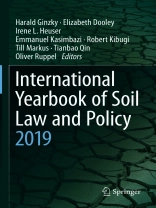This book presents an important discussion on the implementation of sustainable soil management in Africa from a range of governance perspectives. It addresses aspects such as the general challenges in Africa with regard to soil management; the structural deficiencies in legal, organizational and institutional terms; and specific policies at the national level, including land cover policies and persistent organic pollutants.
This fourth volume of the International Yearbook of Soil Law and Policy is divided into four parts, the first of which deals with several aspects of the theme “sustainable soil management in Africa.” In turn, the second part covers recent international developments, the third part presents regional and national reports (i.a. Mexico, USA and Germany), and the fourth discusses cross-cutting issues(i.a. on rural-urban interfaces). Given the range of key topics covered, the book offers an indispensible tool for all academics, legislators and policymakers working in this field.
The “International Yearbook of Soil Law and Policy” is a book series that discusses central questions in law and politics with regard to the protection and sustainable management of soil and land – at the international, national and regional level.
สารบัญ
Part I: Enabling Environment for an Effective Implementation of Soil Governance in Africa: Challenges to Soil Protection and Sustainable Management in Africa
by Francis Marthy Tetteh.- Local Agricultural Intensification Practices and Soil Degradation in Momo Division, North West Cameroon
by Tassah Ivo Tawe.- Persistent Organic Pollutants and Soil Protection: National and Global Imperatives
by Patricia Kameri-Mbote.- Prospects and Challenges for Soil Protection Law in Zambia
by Pamela Towela Sambo.- Combatting Desertification through Soil and Water Conservation and Environmental Rehabilitation Measures: Experiences from the Tigray Region, Ethiopia
by Kelemework Tafere Reda and Desta Gebremichael Gidey.- Indigenous Knowledge and Soil Protection: Anthropological Remarks on Experience in Namibia
by Manfred O. Hinz.- Land Rights, Land Use Patterns and Soil Fertility Significantly Contribute to the Two-decade Long Regional Conflagration in Eastern Congo
by Bila-Isia Inogwabini.- Workshop “Implementing Land Degradation Neutrality in Africa: Means, Legal Instruments and Institutional Challenges?” – Outcome Document
by Harald Ginzky, Oliver Ruppel, Robert Kibugi and Walter Engelberg.-
Part II: Recent International Developments: The Future of International Soil Governance
by Ralph Bodle, Heidi Stockhaus, Franziska Wolff and Sebastian Oberthür.- Critique of the Report “Improving International Soil Governance: Analysis and Recommendations”
by Robert Fowler and Ian Hannam.- The Global Soil Partnership: Tackling Global Soil Threats Through Collective Action
by Natalia Rodriguez Eugenio.-
Part III: Regional/National Reports: Soil Law in Mexico
by José Juan González Márquez and Ana Maria Pacheco Ruiz.- Brumadinho’s Disaster, Mine Tailing Dams and the Environmental Licencing in Brazil: Preventing Risks to Human Wellbeing, Soils, and the Environment
by Paula Galbiatti Silveira, Marina Demaria Venâcio and José Rubens Morato Leite.- The Healthy Soil Program
by Danika Desai.- Soil Protection Governance in Germany
by Harald Ginzky.- The EU Common Agricultural Policy and its Contribution to the Protection and Sustainable Use of Soils: New Approaches for the Period 2021-2027
by Markus Raffelsiefen.-
Part IV: Cross-cutting Issues: Perceptions of Soil in Catholic Theology
by Markus Vogt.- The UN-Habitat Urban-Rural Linkages Guiding Principles – Assessment of the Adoptability to Topical Land Management Challenges in Germany, Kenya and Tanzania
by Stephan Bartke et al.- Aspects of a Legislative and Policy Framework to Manage Soil Carbon Sequestration
by Ian Hannam.












